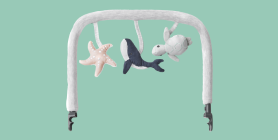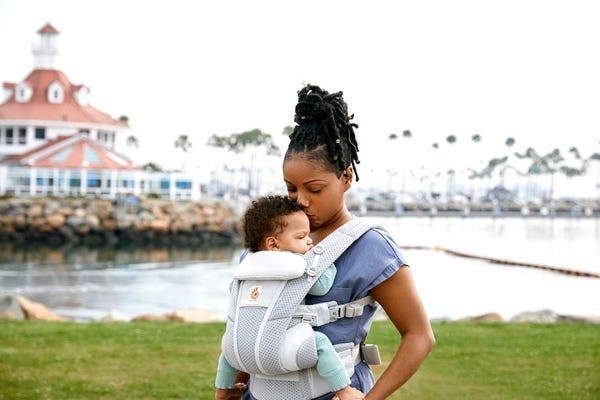Page 3 - Health & Wellness
With all of the joys that accompany pregnancy, there’s also the potential to experience some unpleasant conditions. Pregnant woman are often struck with heartburn and it commonly occurs for two reasons. When functioning optimally, the valve between the esophagus and the stomach (the lower esophageal sphincter) should only open when swallowing to allow food down, then it should quickly close again. During pregnancy the body produces relaxin, a hormone that softens your joints and cervix for delivery, but it also softens the muscles of the esophagus and can keep it from closing as efficiently. The potential for acids to be pushed up past the weakened valve increases when combined with the added pressure that’s put on the stomach as baby grows and organs shift. The delicate lining of the esophagus doesn’t have the same protection against acid that the stomach does. So when acid rises into the esophagus, it causes a burning sensation in the chest, just behind the breastbone. Antacids are usually
[youtube]https://youtu.be/bXqI40a1XIg[/youtube]
When I was 17 years old, I felt a lump in my right breast. I had larger breasts in high school and when I mentioned it to my OB she said it was probably a fibroadenoma (a very common occurrence) but referred me to a specialist just to be safe. The specialist suggested we could do a biopsy, but because I also had several other lumps in both breasts that I should stop taking my birth control to reduce external hormones, cut down on caffeine, and we would keep an eye on it. I was young, carefree, and felt invincible. I knew in the back of my mind everyday that the lump was there, that I should do something about it, but I wanted to live my life. I wanted to have fun. There wasn’t time to slow down, take care of myself, be responsible. Fast forward two years later, and at age 19 my tumor had grown to roughly the size of a tangerine. I knew it was time to go back in. I remember being so afraid, sitting in the waiting room surrounded by older
Mindfulness is defined as the state of being conscious of our feelings, thoughts, and surroundings from moment to moment.
It means being present.
Mindfulness is defined as the state of being conscious of our feelings, thoughts, and surroundings from moment to moment.
It means being present.
It means having an awareness of how good your newborn baby’s head smells, but also being aware of your heart beating faster when your kid won’t nap and you’re desperate for lunch.
Mindfulness allows us to be more fully present with our partner, our children, our boss, ourselves.
It requires not only awareness of what’s going on but acceptance of where we’re at - even if it’s not where we want to be.
It can be hard to stay mindful (let alone to sit and meditate!) when there’s laundry in every room of your house, not a clean nursing bra in sight, and you can’t remember the last time you took a bath by yourself.
Usually, when our life is the most chaotic is when we are most deeply in need of mindfulness.
Babywearing is helpful for when you want to hold a baby and have your hands free, and can be more convenient than a stroller when out and about. But did you know that babywearing can also help with postpartum mental illness, such as anxiety and depression?
Babywearing passively comforts a child
Symptoms of clinical postpartum anxiety, depression, or other postpartum illness, can make it hard for a parent to feel “present” let alone focus on the baby. I often suggest babywearing to my clients, and coach them to start a habit of kissing the baby’s head, and letting the baby cuddle. Even a parent that feels low energy or less than 100% can passively be a loving safe-haven to their child by wearing him or her.
Wear your child to soothe your anxiety
For parents with anxiety, OCD, or fears of something being wrong with the baby, babywearing can also be an easy way to feel comfort. You can go ahead and pat the baby there on your chest as often as you like and get the comfort of feeling the
How many times as a parent have you written a to-do list that seemed totally reasonable, only to be crushed at the end of the day when only one single item got crossed off? How many times have you beaten yourself up for not being able to return a phone call or text, let alone get dressed and prep dinner? How many times have you had to choose between pumping milk at work and eating lunch without flanges attached to your boobs? I’ve lost count on any sort of running total on this Mama Math, and I can no longer consider myself a “new mom,” as my kids are 5 and 7. But I still fall into the trap of adding too many things to my To-Do lists, whether work-, home-, or kid-related, and when I do, I become disappointed in myself. As a Licensed Acupuncturist who specializes in the childbearing cycle, I work with parents every day, and I have come to realize that most of us have expectations of ourselves that are higher than anything we would expect of a friend or family member. Before becoming parents,
For many expecting parents, an approaching due date is time to feather the nest. We complete our registry, set up a nursery, and make sure we have all the baby gear we are going to need. When my first daughter was born, I was caught off guard – floored – by two surprises. One, I knew I would love her, but I didn’t know I would be IN LOVE with her. Second, the postpartum stage was harder than I expected. Much harder. I had dreamy moments of nursing in the glider and cuddling her in a carrier. But there were a lot of challenges I never even dreamed of. Breastfeeding was much harder than I expected, yet I felt strongly, almost rigidly, that it had to be 100% of her nourishment. Having things not go as expected is one of the most common risk factors for postpartum mental illness. And as we know, birth and babies rarely stick to the textbook. The “baby blues” hit 85% to 90% of new mothers, typically on day 4 postpartum, when hormones take a massive drop. This stage usually lasts about two weeks,
Calling all parents and parents-to-be! Dr. Tanya Altmann, MD, FAAPA joins us on Tuesday 7/14 6pm PST for an “Ask the Expert” chat about summer safety. Post your questions on our Facebook wall then join us on our Facebook page for the chat on Tuesday! Sign up below to be eligible to win a Four-Position 360 Carrier.
Chat with us: Tuesday July 14, 6pm PST
 Tanya Altmann, MD, FAAPA working mother and UCLA-trained pediatrician who practices in Southern California, Dr. Tanya Altmann is a best-selling author, network television parenting expert, and entertainment industry consultant. Dr. Tanya Altmann is an American Academy of Pediatrics spokesperson, approved by the national physician organization to communicate complicated medical issues into easily understood concepts.
Tanya Altmann, MD, FAAPA working mother and UCLA-trained pediatrician who practices in Southern California, Dr. Tanya Altmann is a best-selling author, network television parenting expert, and entertainment industry consultant. Dr. Tanya Altmann is an American Academy of Pediatrics spokesperson, approved by the national physician organization to communicate complicated medical issues into easily understood concepts.
 Are you ready for Summer? We sure are...our friend Heidi Powell recently used our Performance Ventus Carrier to show us some moves you can do with baby. Head over to Heidi's blog to see the full workout you can do with your little one in tow!
Please use caution when attempting any of the carries, exercise or activities highlighted on this blog, social media or any other content channels. Please use common sense and caution when using a baby carrier. You should consult a physician before starting any diet or exercise program. For more information, see our Disclaimer.
Are you ready for Summer? We sure are...our friend Heidi Powell recently used our Performance Ventus Carrier to show us some moves you can do with baby. Head over to Heidi's blog to see the full workout you can do with your little one in tow!
Please use caution when attempting any of the carries, exercise or activities highlighted on this blog, social media or any other content channels. Please use common sense and caution when using a baby carrier. You should consult a physician before starting any diet or exercise program. For more information, see our Disclaimer. Clockwise: @ashleyanielson // @marylauren // @firstimefarmers // @kauilife
Here's a round up of some of our favorite mamas to follow on Instagram. We'll be doing this feature once a month and hope to share some of the inspiring women who fill our feed with beauty each day in the spirit of sharing the love in this wonderful community. We hope you enjoy! xo DaniWall Angels
 These are just as they sound. Think of “snow angels” performed leaning against a wall with arms bent. The best way to do this is to stand with you back against the wall, walk your feet out 1.5-2ft. and place arms against the wall in a “stick-em-up” position. To make sure you back is flat against the wall you may have to tilt your pelvis
These are just as they sound. Think of “snow angels” performed leaning against a wall with arms bent. The best way to do this is to stand with you back against the wall, walk your feet out 1.5-2ft. and place arms against the wall in a “stick-em-up” position. To make sure you back is flat against the wall you may have to tilt your pelvis 
























